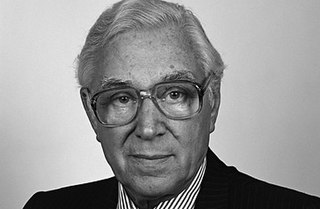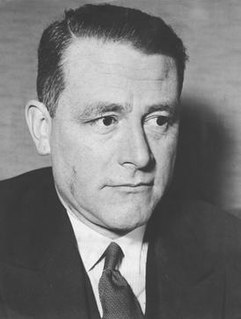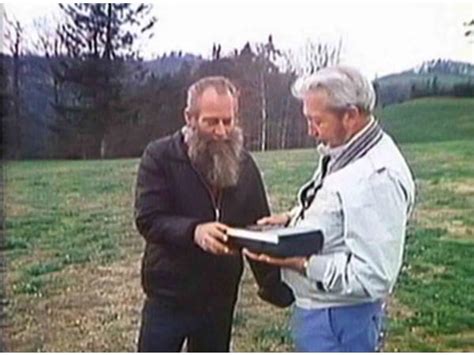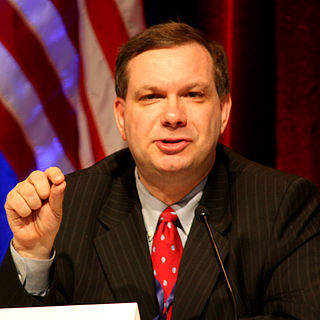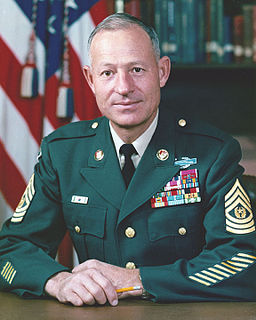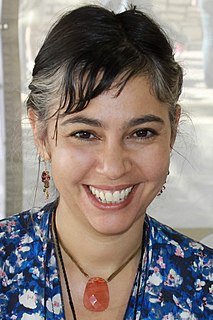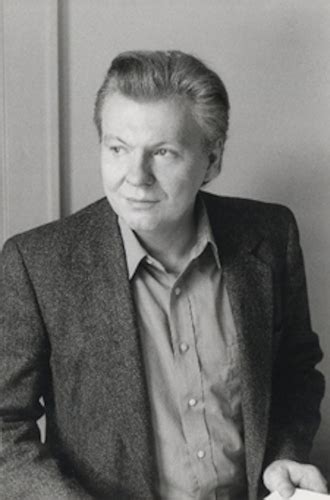Top 1161 Ethical Dilemmas Quotes & Sayings - Page 18
Explore popular Ethical Dilemmas quotes.
Last updated on December 19, 2024.
At the center of the Christian faith is the affirmation that there is a God in the universe who is the ground and essence of all reality. A Being of infinite love and boundless power, God is the creator, sustainer, and conserver of values....In contrast to the ethical relativism of [totalitarianism], Christianity sets forth a system of absolute moral values and affirms that God has placed within the very structure of this universe certain moral principles that are fixed and immutable.
Sportsmanship is the ethical and moral dimension of sports. It is demonstrated by a number of attributes and attitudes such as fair play, respect for the rules and traditions of the sport and various traits of good character including integrity (abiding by the letter and spirit of the rules and concepts of honor); demonstrated respect for others including teammates, opponents, officials and spectators; accountability, self-control, and graciousness in victory and defeat.
It [an ethical problem with in vitro fertilization] depends on whether you're talking ethics from the standpoint of some religious denomination or from just truly religious people. The Jewish or Catholic faiths, for example, have their own rules. But just religious people, who will make very devoted parents, have no problem with in vitro fertilization.
The outer ring of Christianity is a rigid guard of ethical abnegations and professional priests; but inside that inhuman guard you will find the old human life dancing like children and drinking wine like men; for Christianity is the only frame for pagan freedom. But in the modern philosophy the case is opposite; it is its outer ring that is obviously artistic and emancipated; its despair is within.
As Muslims, we must have an active presence based on ethical and moral consistency. We need to be very vocal, to inform people, to demonstrate when necessary. We need to write so that the people understand that what they are getting from the media and politicians is biased and not accurate. And this is true especially when it comes to some communities within the U.S. or with respect to the Middle East and Africa. This is what I am expecting from a new generation of leaders: Meet these expectations of moral consistency.
Just as the law of gravitation existed before its discovery and would exist if all humanity forgets it, so it is with the laws that govern the spiritual world. The moral, ethical and spiritual relations between soul and soul and between individual spirits and the Father of all spirits were there before their discovery and would remain even if we forget them.
I have already indicated to you the meaning of the word religion, as applied to Islam. The truth is that Islam is not a Church. It is a State conceived as a contractual organism long before Rousseau ever thought of such a thing, and animated by an ethical ideal which regards man not as an earth-rooted creature, defined by this or that portion of the earth, but as a spiritual being understood in terms of a social mechanism, and possessing rights and duties as a living factor in that mechanism.
We live in a world of nuclear giants and ethical infants, in a world that has achieved brilliance without wisdom, power without conscience. We have solved the mystery of the atom and forgotten the lessons of the Sermon on the Mount. We know more about war than we know about peace, more about dying than we know about living.
The concept of humanity is an especially useful ideological instrument of imperialist expansion, and in its ethical-humanitarian form it is a specific vehicle of economic imperialism. Here one is reminded of a somewhat modified expression of Proudhon’s: whoever invokes humanity wants to cheat. To confiscate the word humanity, to invoke and monopolize such a term probably has certain incalculable effects, such as denying the enemy the quality of being human and declaring him to be an outlaw of humanity; and a war can thereby be driven to the most extreme inhumanity.
An Albanian’s house is the dwelling of God and the guest.’ Of God and the guest, you see. So before it is the house of its master, it is the house of one’s guest. The guest, in an Albanian’s life, represents the supreme ethical category, more important than blood relations. One may pardon the man who spills the blood of one’s father or of one’s son, but never the blood of a guest.
One of the sad things about this political season is that it allows [requires] us to get behind our big "Liberal" or "Conservative" banner and forget, for a time, that the big problems in our country have been around a long time and have been batted back and forth, caused and exacerbated, by both sides, and are more spiritual or ethical than [merely] political.
The civil magistrate cannot function without some ethical guidance, without some standard of good and evil. If that standard is not to be the revealed law of God (which, we must note, was addressed specifically to perennial problems in political morality), then what will it be? In some form or expression it will have to be the law of man (or men) — the standard of self-law or autonomy.
When you hold out for high standards, people are impressed-but they don't always like you for it. Not everybody will be on your side in your struggle to do what's right and ethical. In fact, sometimes even you won't be on your side. You'll wrestle with inner conflict, torn between what you should do and what you want to do. You'll also aggravate other people. Seems when you walk the straight and narrow you always step on someone's toes. Don't count on the ethics of excellence to make you popular.
Undeniably, character does count for our citizens, out communities, and our Nation, and this week we celebrate the importance of character in our individual lives... core ethical values of trustworthiness, fairness, responsibility, caring, respect, and citizenship form the foundation of our democracy, our economy, and our society... Instilling sound character in our children is essential to maintaining the strength of our Nation into the 21st century.
One of the interesting things about the ancient Greeks is that they really didn't have our conception of individual rights. They didn't have our conception of all lives matters. And it was really was true for them, that certain lives matter a lot more than others. It didn't dawn on them that all lives, although different, can be lives of equal mattering. And that is actually something a huge ethical lesson.
Those of us who believe in God and derive our sense of right and wrong and ethics from God's Word really have no difficulty whatsoever defining where our ethics come from. People who believe in survival of the fittest might have more difficulty deriving where their ethics come from. A lot of evolutionists are very ethical people.
This focus on money and power may do wonders in the marketplace, but it creates a tremendous crisis in our society. People who have spent all day learning how to sell themselves and to manipulate others are in no position to form lasting friendships or intimate relationships... Many Americans hunger for a different kind of society - one based on principles of caring, ethical and spiritual sensitivity, and communal solidarity. Their need for meaning is just as intense as their need for economic security.
Our crisis is a birth. We are one living system and we have come to the limit of one phase of natural growth on a finite planet We must learn ethical evolution quickly As we seek to facilitate a gentle birth, a graceful and nonviolent transition to the next stage of our evolution, we will discover a natural pattern, a design of our birth transition, and develop a plan to cooperate with this design.
Sentimentalising is anathema, as far as I am concerned. It leads you into ethical problems about violence and killing and eating meat. The whole world becomes topsy-survy if you impose moralities that were evolved within human society on what a blowfly or what a parasite does... there are lots of emotions you can deduce from an animal's behaviour that are correct, but when you start saying it's feeling guilty or thinking or a loved one or mourning, you must be very careful of those feelings.
I think that my strong determination for justice comes from the very strong, dynamic personality of my father ... I have rarely ever met a person more fearless and courageous than my father ... The thing that I admire most about my dad is his genuine Christian character. He is a man of real integrity, deeply committed to moral and ethical principles. He is conscientious in all of his undertakings ... If I had a problem I could always call Daddy.
Ultimately, one of the best ways to take care of our souls is to build a society that supports rather than undermines our highest moral and spiritual intuitions and inclinations. Yet, building that society can never be divided from the daily practices through which we live out our ethical and spiritual lives, both in the way we treat others around us, and in the way we nourish the God within us.
The number one reason most people don't get what they want is that they don't know what they want. Rich people are totally clear that they want wealth. They are unwavering in their desire. They are fully committed to creating wealth. As long as it's legal, moral, and ethical, they will do whatever it takes to have wealth. Rich people do not send mixed messages to the universe. Poor people do.
Using the phrase business ethics might imply that the ethical rules and expectations are somehow different in business than in other contexts. There really is no such thing as business ethics. There is just ethics and the challenge for people in business and every other walk in life to acknowledge and live up to basic moral principles like honesty, respect, responsibility, fairness and caring.
A republican form of government requires four standards: It demands a highly educated population manifesting critical thinking that participates in the affairs of the nation. It requires that citizens invest in a similar moral code. It insists on a mutual ethical system abided by all. It must engender a single language whereby all citizens can discuss, debate, come to resolution and initiate mutual beneficial action for their society.
Ultimately, I don't know if love is an organizing principle we choose or if it's innate. I'm not sure the distinction matters to me much anymore; I just care about how we can reduce unnecessary suffering. I think that means learning to love in both the micro and the macro; engaging in ethical action at the level of intimacy and friendship, but also at the vocational level through our chosen work in the world, our right livelihood.
We find ourselves ethically destitute just when, for the first time, we are faced with ultimacy, the irreversible closing down of the earth's functioning in its major life systems. Our ethical traditions know how to deal with suicide, homicide and even genocide, but these traditions collapse entirely when confronted with biocide, the killing of the life systems of the earth, and geocide, the devastation of the earth itself.
Over the centuries, we've moved on from Scripture to accumulate precepts of ethical, legal and moral philosophy. We've evolved a liberal consensus of what we regard as underpinnings of decent society, such as the idea that we don't approve of slavery or discrimination on the grounds of race or sex, that we respect free speech and the rights of the individual. All of these things that have become second nature to our morals today owe very little to religion, and mostly have been won in opposition to the teeth of religion.
We should remember what a rapper like Tupac Shakur was doing, to a certain degree, who came from an experience of politicization very close to being a "Panther Baby". He knew, he came from that experience of the Black Panthers, and accounting for all his contradictions and process of growth, he achieved politically through gangsta rap things that no conscious rapper has achieved, such as establishing political, ethical, and moral codes between Crips and Bloods in the United States.
Tom Coburn never forgot that members of Congress are spending the hard-earned money of the people back home. Even a lot of conservatives end up forgetting that. Here's hoping that back in the private sector, Tom Coburn keeps up the fight for his beliefs and that he remains a constant reminder to lawmakers and the White House of ethical standards to which all should aspire.
Every genuinely literary style, from the high authorial voice to Foster Wallace and his footnotes-within-footnotes, requires the reader to see the world from somewhere in particular, or from many places. So every novelist's literary style is nothing less than an ethical strategy - it's always an attempt to get the reader to care about people who are not the same as he or she is.
A full-dressed ecclesiastic is a sort of go-cart of divinity; an ethical automaton. A clerical prig is, in general, a very dangerous as well as contemptible character. The utmost that those who thus habitually confound their opinions and sentiments with the outside coverings of their bodies can aspire to, is a negative and neutral character, like wax-work figures, where the dress is done as much to the life as the man, and where both are respectable pieces of pasteboard, or harmless compositions of fleecy hosiery.
But though Usury is in itself immoral, and justly condemned by every ethical code, its chief and worst defect in the particular case we are now examining, the growth of Capitalism and its increasing proletariat, is the centralization of irresponsible control over the lives of men: the putting power over the proletariat into the hands of a few who can direct the loans of currency and credit without which that proletariat could not be fed and clothed and maintained in work.
I think morality is more important than ever before. As we gain more power, the question of what we do with it becomes more and more crucial, and we are very close to really having divine powers of creation and destruction. The future of the entire ecological system and the future of the whole of life is really now in our hands. And what to do with it is an ethical question and also a scientific question.
This isn't animal experimentation, where you an imagine some proportionate good at the other end of the suffering. This is what we feel like eating. Tell me something: Why is taste, the crudest of our sense, exempted from the ethical rules that govern our other sense? If you stop and think about it, it's crazy. Why doesn't a horny person has as strong a claim to raping an animal as a hungry one does to killing and eating it?
All media work us over completely. They are so pervasive in their personal, political, economic, aesthetic, psychological, moral, ethical, and social consequences that they leave no part of us untouched, unaffected, unaltered. The medium is the message. Any understanding of social and cultural change is impossible without a knowledge of the way media work as environments. All media are extensions of some human faculty - psychic or physical.
In all the known history of Mankind, advances have been made primarily in physical technology; in the capacity of handling the inanimate world about Man. Control of self and society has been left to to chance or to the vague gropings of intuitive ethical systems based on inspiration and emotion. As a result no culture of greater stability than about fifty-five percent has ever existed, and these only as the result of great human misery.
A code of ethics cannot be developed overnight by edict or official pronouncement. It is developed by years of practice and performance of duty according to high ethical standards. It must be self-policing. Without such a code, a professional soldier or a group soon loses identity and effectiveness. Once we know our job, have a genuine code of ethics, and maintain unquestioned personal integrity, we have met the first and most demanding challenge of leadership.
I had to change. I had to change was the thought that drove me in those months of planning. Not into a different person, but back to the person I used to be—strong and responsible, clear-eyed and driven, ethical and good. And the PCT would make me that way. There, I’d walk and think about my entire life. I’d find my strength again, far from everything that had made my life ridiculous.
I want to yell about it most days and stop strangers in the street to share my outrage. But my mind is too serpentine to offer instant poem reactions. I can however stand back and examine the deeper ground, or at least that's what I hope my poems are doing. I believe contemplation can be an ethical act and literature can be a profound agent of cultural change, so I hope in some way my poems expand the conversations about environmental decline and social responsibility.
All countries must be governed by the modern people; they must be governed by the progressive people; they must be governed by those who believe in the reason and science; they must be governed by the compassionate and just, by the ethical and honest, by the nonviolent and peaceful people; they must be governed by the libertarians; they must be governed by the people who believe in the enlightenment and who refuse to shape the society based on some childish religious stories!
One of the marks of our world is perhaps this reversal: we live according to a generalized image-repertoire. Consider the United Sates, where everything is transformed into images: only images exist and are produced and are consumes ... Such a reversal necessarily raises the ethical question: not that the image is immoral, irreligious, or diabolic (as some have declared it, upon the advent of the Photograph), but because, when generalized, it completely de-realizes the human world of conflicts and desires, under cover of illustrating it.
There are studies that have shown that we make decisions, ethical and otherwise, based on the way we imagine ourselves as characters in the stories of our lives. In other words, if we imagine ourselves brave or crazy or open, we're more likely to make decisions in a given situation based on how we imagine ourselves, whatever the facts may be.
The next decade will perhaps raise us a step above despair to a cleaner, clearer wisdom and biology cannot fail to help in this. As we become increasingly aware of the ethical problems raised by science and technology, the frontiers between the biological and social sciences are clearly of critical importance-in population density and problems of hunger, psychological stress, pollution of the air and water and exhaustion of irreplaceable resources.
One of the reasons it's important for me to write about war is I really think that the concept of war, the specifics of war, the nature of war, the ethical ambiguities of war, are introduced too late to children. I think they can hear them, understand them, know about them, at a much younger age without being scared to death by the stories.
Some people may argue that if the animals are treated humanely prior to being slaughtered, this justifies their confinement and slaughter. Is it ethical to rob beings of their freedom but give them a comfortable prison and provide them with food until they become fat enough to be slaughtered? Any way you look at it, farms are places where animals are kept in preparation to be slaughtered and ultimately eaten as food.
All attempts at law, all religion, all ethical norms might be nothing more than attempts by the weak to restrain the strong. Then, within the law, arise the new strong, who subvert the law for their own ends of power and family interest, leaving the old strong outside their circle to pursue the waiting possibilities which they call crime. The weak, the cowardly, the decent ones, live between these groups.
Over his illustrious career, John Harris has explored the most challenging bioethical questions with insight, engaging wit, and eloquence. In Enhancing Evolution, Harris does it again. He argues that it is not just an option but an obligation for people to use available biomedical technologies to enhance their own--and their children's--physical and mental abilities. Harris rightly deserves his reputation for fearlessly following his ethical arguments wherever they lead.
Love in truth-caritas in veritate-is a great challenge for the Church in a world that is becoming progressively and pervasively globalized. The risk for our time is that the de facto interdependence of people and nations is not matched by ethical interaction of consciences and minds that would give rise to truly human development. Only in charity, illumined by the light of reason and faith, is it possible to pursue development goals that possess a more humane and humanizing value.
In fact, the answers that religion, as we have come to know it, provides to the question of human worth have played so dominant a role in the preceding centuries that believers often cannot conceive how non-believers can muster sufficient commitment to their own lives to get out of bed each morning, let alone the ethical wherewithal to regard others as deserving of moral regard. Once one "comes out" as an atheist, these are the inquisitions to which one is often subjected.
We are about to enter a new era in which, each year, less net energy will be available to humankind, regardless of our efforts or choices. The only significant choice we will have will be how we adjust to this new regime. That choice - not whether, but how to reduce energy usage and make a transition to renewable alternatives - will have profound ethical and political ramifications.
Awakening is not a state but a process: an ethical way of life and commitment that enables human flourishing. As such, it is no longer the exclusive preserve of enlightened teachers or accomplished yogis. Likewise, nirvana-the stopping of craving-is not the goal of the path but its very source. For human flourishing first stirs in that clear, bright, empty space where neurotic self-centredness realizes that it has no ground at all to stand on. One is then freed to pour forth like sunlight.
True freedom is not advanced in the permissive society, which confuses freedom with license to do anything whatever and which in the name of freedom proclaims a kind of general amorality. It is a caricature of freedom to claim that people are free to organize their lives with no reference to moral values, and to say that society does not have to ensure the protection and advancement of ethical values. Such an attitude is destructive of freedom and peace.
The axioms of physics translate the laws of ethics. Thus, "the whole is greater than its part;" "reaction is equal to action;" "the smallest weight may be made to lift the greatest, the difference of weight being compensated by time;" and many the like propositions, which have an ethical as well as physical sense. These propositions have a much more extensive and universal sense when applied to human life, than when confined to technical use.
If I pick up a book with spaceships on the cover, I want spaceships. If I see one with dragons, I want there to be dragons inside the book. Proper labeling. Ethical labeling. I don't want to open up my cornflakes and find that they're full of pebbles... You need to respect the reader enough not to call it something it isn't.
Children will, in my dream, be taught that laziness and narcissism are at the very root of human evil, and why this is so. . . . They will come to know that the natural tendency of the individual in a group is to forfeit his or her ethical judgment to the leader, and that this tendency should be resisted. And they will finally see it as each individual's responsibility to continually examine himself or herself for laziness and narcissism and then to purify themselves accordingly.
By helping to raise man above the level of bestial vegetation, faith contributes in reality to the securing and safeguarding of his existence. Take away from present-day mankind its education-based, religious-dogmatic principles- or, practically speaking, ethical-moral principles- by abolishing this religious education, but without replacing it by an equivalent, and the result will be a grave shock to the foundations of their existence.
Ethics cannot be based upon our obligations toward people, but they are complete and natural only when we feel this Reverence for Life and the desire to have compassion for and to help all creatures insofar as it is in our power. I think that this ethic will become more and more recognized because of its great naturalness and because it is the foundation of a true humanism toward which we must strive if our culture is to become truly ethical.


